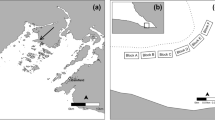Abstract
The transport and establishment of non-indigenous species in coastal marine environments are increasing worldwide, yet few studies have experimentally addressed the interactions between potentially dominant non-native species and native organisms. We studied the effects of the introduced mussel Musculista senhousia on leaf and rhizome growth and shoot density of eelgrass Zostera marina in San Diego Bay, California. We added M. senhousia over a natural range in biomass (0–1200 g dry mass/m2) to eelgrass in transplanted and established beds. The effects of the non-indigenous mussel varied from facilitation to interference depending on time, the abundance of M. senhousia, and the response variable considered. Consistent results were that mussel additions linearly inhibited eelgrass rhizome elongation rates. With 800 g dry mass/m2 of M. senhousia, eelgrass rhizomes grew 40% less than controls in two eelgrass transplantations and in one established eelgrass bed. These results indicate that M. senhousia, could both impair the success of transplantations of eelgrass, which spread vegetatively by rhizomes, and the spread of established Z. marina beds to areas inhabited by M. senhousia. Although effects on leaf growth were not always significant, in August in both eelgrass transplantations and established meadows leaf growth was fertilized by mussels, and showed a saturation-type relationship to sediment ammonium concentrations. Ammonium concentrations and sediment organic content were linear functions of mussel biomass. We found only small, non-consistent effects of M. senhousia on shoot density of eelgrass over 6-month periods. In established eelgrass beds, but not in transplanted eelgrass patches (≈0.8 m in diameter), added mussels suffered large declines. Hence, eelgrass is likely to be affected by M. senhousia primarily where Z. marina beds are patchy and sparse. Our study has management and conservation implications for eelgrass because many beds are already seriously degraded and limited in southern California where the mussel is very abundant.
Similar content being viewed by others
Author information
Authors and Affiliations
Additional information
Received: 31 May 1997 / Accepted: 4 September 1997
Rights and permissions
About this article
Cite this article
Reusch, T., Williams, S. Variable responses of native eelgrass Zostera marina to a non-indigenous bivalve Musculista senhousia . Oecologia 113, 428–441 (1998). https://doi.org/10.1007/s004420050395
Issue Date:
DOI: https://doi.org/10.1007/s004420050395




